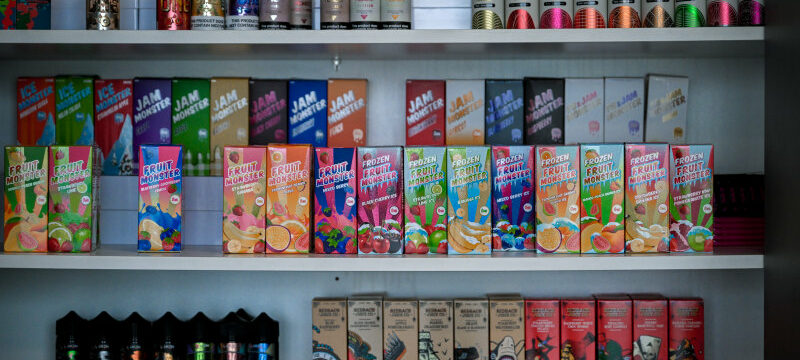Save articles for later
Add articles to your saved list and come back to them any time.
Almost two years after the Morrison government moved to curb widespread access to nicotine-based vaping products, it is clear the prescription-only “solution” has been a hapless failure. Instead of cruelling demand for vapes, the requirement for users to obtain a prescription for nicotine from a medical practitioner has simply created new, and more lucrative, opportunities for manufacturers and distributors of vapes.
Disposable vapes, often containing extraordinary levels of nicotine, are easily available to anyone, including children and adolescents, via chain convenience stores, corner shops and some service stations. They are produced from under the counter, without questions, and sold in an array of lolly-like flavours deliberately intended to entice young people.
Credit: Paul Jeffers
The easiest work-around for distributors since the introduction of prescription requirements has been to remove labels describing how much nicotine might be in the product. And that means children are often unwittingly buying products from retailers that contain as much as 50 milligrams of nicotine per millilitre of fluid – about four times the average strength of cigarettes.
Vast quantities of nicotine-based vapes are also being imported by individuals buying online, often directly from manufacturers in China or from New Zealand, where some suppliers advertise next-day delivery into Australia.
As the Therapeutic Goods Administration noted in a consultation paper in November, not only were the existing regulations not achieving their intended purpose but a large black market in vaping products had emerged.
Health Minister Mark Butler vowed he would crack down on vaping, and in May the government unveiled plans to ban single-use, disposable nicotine-based vapes; staunch the import of non-prescription-based vaping products; and impose minimum standards regulating flavours and content.
Adopting a seven-year national tobacco strategy to combat smoking and nicotine addiction is inherently an excellent idea, and the government’s recent plan was strongly welcomed by medical and health groups appalled by what they see as an “epidemic” in vaping and an increase in smoking rates. Groups supporting the proposal included peak bodies representing doctors; medical research groups; the Australian Competition and Consumer Commission; and state and territory health departments.
But, as emails released under freedom-of-information laws reveal, at least two of the 10 members of the Australian National Advisory Council on Alcohol and Other Drugs have expressed misgivings about a blanket ban on vaping. They fear it may further stimulate an already burgeoning black market; that it fails to properly incorporate harm reduction strategies; and that a better response would be to regulate supply of nicotine-based vapes rather than trying to extinguish the trade.
At the same time, lobbyists representing the convenience stores have argued that vapes should be regulated in the same way as tobacco. Rather than broadly legalising them and regulating them in the same way as tobacco or alcohol, The Age has urged a more cautious approach due to the uncertainty around health effects. The research literature on pros and cons of nicotine-based vaping materials shows mixed outcomes. While nicotine vapes have helped many smokers quit, the long-term health impacts are not clear. And while they do not contain the same carcinogenic substances as traditional cigarettes, their actual contents can be a mystery.
By all means, tightly regulate local, over-the-counter sales to ensure vape ingredients are fully labelled. Regulate to ban sales of any nicotine products to young people, and ensure only tobacco-licensed traders can provide them. Tax vapes heavily to make them less affordable.
But where does that leave the control over online imports and the secretive black market trade that slides past Australia’s borders? Notwithstanding what the federal government might hope the Australian Border Force can do, its customs officers evidently do not have the resources to staunch the incessant flow of discrete little parcels containing nicotine.
Prohibition may sound seductive in its simplicity, but it can be complicated in its implementation and lead to worse outcomes. Nuance is needed. We agree strongly with the intent on reining in this product, but the government needs to rethink its proposed blanket ban.
Patrick Elligett sends an exclusive newsletter to subscribers each week. Sign up to receive his Note from the Editor.
Most Viewed in National
From our partners
Source: Read Full Article

